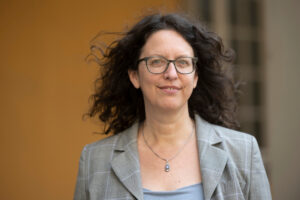The landmark IPCC reports on the physical science basis of climate change have been some of the most influential documents informing climate policy. Producing such a report is a lengthy process – a new report is published every six years! – involving hundreds of scientists from all over the world. 234 scientists authored the latest IPCC report (2021), of whom 6 are members of the FORCeS consortium (including a member of FORCeS scientific advisory group). We interviewed all six of them to find out what the process has been like and what they have learnt from it.

What was your contribution in IPCC’s 6th Assessment Report on the scientific basis of climate change?
I was serving as a lead author to working group 1 (Physical science basis), chapter 2 (Changing state of the climate system). In this, I was responsible for the solar and volcanic forcing, the aerosols, and the radiative forcing evolution. I was also in this regard one of the persons linking Chapter 2 to the chapters on short-lived climate forcers and on the Earth’s energy budget. I think I helped sharpening and corroborating the headline statement that the rate of change of the climate forcing is increasing (which is closely related to FORCES work, since a key reason is the cleanup of the anthropogenic aerosol).
Can you describe your experience from the process of putting together such a report?
It is really a group effort. In particular a real team work conceiving and writing the chapter, but also across chapters and even working groups writing special aspects. It was also a fantastic experience to get the expert in put from so many colleagues who contributed their insights and data as contributing authors.
In your opinion, what are the rewards of contributing to this process for a climate scientist?
It is widely perceived as an important work in our field, but also by the public (at least in Germany). It is thus an honour to be part of it.
Do you have any suggestions for changes/amendments to the process of producing IPCC assessments reports in the future?
A key thing is very early in the process, namely the scoping. I think it would be good if there was a review process, or an iteration option, for the themes of the chapters.

What was your contribution in IPCC’s 6th Assessment Report on the scientific basis of climate change?
I was a Coordinating Lead Author (with Piers Forster) of Ch 7 of AR6 (WG1) (“The Earth’s Energy Budget, Climate Feedbacks, and Climate Sensitivity”)
Can you describe your experience from the process of putting together such a report?
This was a great experience overall! Working with so many brilliant scientists worldwide and assessing and discussing the latest literature in our field with them was really rewarding and fun! Needless to say, it was also very time consuming, and covid made the process even more complicated, but overall I thought it was well worth the time and effort. Interfacing with the policymakers during the approval session was also a new and interesting experience for me!
In your opinion, what are the rewards of contributing to this process for a climate scientist?
As I touched on above, I think anyone who gets involved in the process will learn a lot and expand their networks considerably. While being an IPCC author might take some time away from one’s own research in the short term, I think there can be really great benefits in the longer term. As a specific example, having a good overview of the key knowledge gaps in your field really helps when writing research proposals!
Do you have any suggestions for changes/amendments to the process of producing IPCC assessments reports in the future?
From my point of view, there are no radical changes needed to the process. I think the reports continue to be important and highly influential and so should continue in a similar matter as before. My experience is also that in-person author meetings are critical for the quality of the reports, so although we should generally try to travel less to reduce emissions I think the IPCC autor meetings are absolutely necessary and can probably be justified as long as the reports continue to be important and relevant.

What was your contribution in IPCC’s 6th Assessment Report on the scientific basis of climate change?
I was lead author of chapter 6 “Short Lived Climate Forcers”, that is the chapter that assesses the chemistry – climate interaction and how air pollution and climate change are linked. This chapter points out that immediate CH4 emission reductions are a win-win for air pollution and climate change mitigation.
Can you describe your experience from the process of putting together such a report?
Working in a highly diverse team with respect to scientific and cultural background was an enriching experience in multiple ways. Learning about the various experiences and backgrounds of the other authors on the chapter team and within and across IPCC working groups was great and also demanding. The coordination needed to ensure a consistent report is huge and it was very interesting to see which tools and ways the IPCC head office had implemented and what worked best.
In your opinion, what are the rewards of contributing to this process for a climate scientist?
Apart from widening ones horizon regarding scientific context, the process also made me more aware of stakeholder perspectives and how to best communicate climate science in the wider public.
Do you have any suggestions for changes/amendments to the process of producing IPCC assessments reports in the future?
Not really….

What was your contribution in IPCC’s 6th Assessment Report on the scientific basis of climate change?
I was a contributing author on chapter 6 on Short-lived climate forcers and my work focused on producing figures for this chapter.
Can you describe your experience from the process of putting together such a report?
When the last IPCC assessment report came out, I was not yet doing climate science and it was while reading this report for a course that I really decided to change my career track and go into climate science. To then be able to contribute to the next report that came out was just such a highlight and really exciting. It was also impressive to see first hand the amount of work and effort that goes into these reports. Since I was involved in producing the figures, this involved a significant amount of afterwork in making the figures truly reproducible and in adherence to the principles of open science. These endeavours are time consuming, but extremely valuable for the credibility of the science.
In your opinion, what are the rewards of contributing to this process for a climate scientist?
Huge! For me, contributing to this report is in many ways amongst the most impactful things we can do as climate scientists and is therefore an important goal in itself (without being the means to an end). In terms of rewards, I think the increase in network is important, but not least the gain in overview of the climate field and all the interdisciplinary connections that are made in the field. In this way, I think the more involved you are, the more you learn, and the better a researcher you will become.
Do you have any suggestions for changes/amendments to the process of producing IPCC assessments reports in the future?
Not really, and I think I might be a bit too junior to have an opinion on this. Ask me after the next time!

What was your contribution in IPCC’s 6th Assessment Report on the scientific basis of climate change?
I was serving as a lead author of the WGI Chapter 6 (Short-lived climate forcers). It is for the first time that IPCC assessment report had a dedicated chapter to SLCFs, recognizing importance of improved understanding of their role, and atmospheric chemistry at large, in climate change but also in its mitigation and strong linkages to air quality and sustainable development issues. My contribution centered around the assessment of the future evolution of these species and linkages to air quality impacts, including policy dimension; the latter was a bit of an ‘unwanted child’ since WGI has typically avoided direct discussion of policy implications associated with the WGI Assessments.
Can you describe your experience from the process of putting together such a report?
If you will be invited, do it! It has been an honour, challenge, great experience…although, I am not sure I’d do it again. It has been rather time demanding and COVID aggravated that; I believe the dedicated in person meetings were so much more productive, unfortunately we had only two of those. I have enjoyed every minute of the direct exchange we had within the chapter authors’ meetings: one feels challenged but respected and trusted. Receiving thousands of often contradictory comments to your chapter might be daunting but with the group of brilliant and dedicated minds things are sorted out and everyone helps others as they can. And credit to TSU (technical support unit) and review editors who are great help in the process and often share the experience from past assessments that is invaluable, especially to those of us who were new to it. Finally, the approval session! Oh my, that was interesting and a bit scary; my blunt thoughts after the first day were ‘clash of civilizations’ and ‘speed chess’ as you feel often misunderstood (maybe on purpose) and set under time pressure to give in. Certainly the approval process is not for everyone and experience pays; again, the team spirit of the IPCC authors and willingness to support and help each other sitting on this side of barricade is great! Participating in the approval process might help to understand why so little is actually done about climate change mitigation in spite of all the growing, and ever more robust, knowledge about the consequences of climate change.
In your opinion, what are the rewards of contributing to this process for a climate scientist?
You have the chance to meet incredible minds and get to know them also as ‘humans’ 😊, expanding your network and possibly engaging in new projects, work. During the discussions we have jointly identified also areas where we definitely need more work or understood better the problem areas. For those who do it for the first time, huge learning experience that you cannot buy anywhere. Not everyone is ready to talk to media but if you do, then this can give you a real opportunity to shine as after the report is published there are several opportunities to share this work with various media in your country and internationally.
Do you have any suggestions for changes/amendments to the process of producing IPCC assessments reports in the future?
It is a very well organized and professionally supported process. I strongly believe that the in-person meetings shall be retained, this type of exchange is fundamental to the quality of the assessment. Significant effort was made to assure exchange between WGI,II,III as the process progressed but in view of the importance of implementation of the best available knowledge in policy making, I’d think that also WGI should have a possibility to make statements that are directly relevant for policy makers, something that was not very welcomed, while I agree that clear coordination and consensus with WGII and WGIII shall be achieved to avoid any future contradictions, since the WGII and WGIII reports come out so much later. Speaking of which; I think it might be useful to think how to shorten the process of producing each assessment. It might require more time from the authors within say 2 years and would be possible only if dedicated support to all participating scientists would be assured but I think this would have also many benefits.
Prof. Nicolas Bellouin (member of FORCeS scientific advisory group)
 What was your contribution in IPCC’s 6th Assessment Report on the scientific basis of climate change?
What was your contribution in IPCC’s 6th Assessment Report on the scientific basis of climate change?
I was a lead author on Chapter 3 Human influence on the climate systems. I looked after the assessment of human influence on large-scale temperature change. Humans are responsible for all the increase in surface temperature since 1850-1900. I also looked after the assessment of human influence on vegetation growth and “greenness” of the Earth. Fertilisation of plant growth by increased carbon dioxide and planting of forests both increase greenness in some regions. It is difficult to identify which driver dominates but since they both are human influences the big picture remains of a carbon cycle deeply affected by human activities. I also contributed to other chapters, notably Chapter 6 on Short lived climate forcers and Chapter 7 on the Earth’s energy budget. Those contributions are close to my scientific expertise on the radiative forcing of atmospheric aerosols. We made the case for reduced uncertainties in some respects since the previous Assessment Report. I also coordinated the third section of the Technical Summary. This document sits between the thousands of pages worth of chapters and the Summary for Policymakers. It is a summary, but more detailed and nuanced than the Summary for Policymakers. This is also a great resource for teaching: we spent time designing figures that integrate knowledge across several chapters of the reports. Finally, I contributed to the Summary for Policymakers and attended some of its approval session.
Can you describe your experience from the process of putting together such a report?
Being involved in an IPCC report is a lot of work and switching online because of the pandemic did not help. The AR6 tried out a new structure, where the description of large-scale climate changes was restricted to only three chapters, with more discussion space being dedicated to the understanding of physical processes (the carbon cycle, water cycle, energy budget, etc.) and regional climate changes. That structure worked mostly well but implied a lot of cross-chapter coordination – so meant many meetings and discussion topics that kept coming back. Within my chapter, we also had very technical discussions on surface temperature variability, upper air temperature trends, and carbon cycle trends. It could be argued that discussions of a very technical nature take too much time, since they have limited influence on the high-level conclusions given in the Summary for Policymakers. But those discussions guarantee the scientific rigour and authoritative nature of the assessment.
In your opinion, what are the rewards of contributing to this process for a climate scientist?
The main reward, personally, was getting the motivation to refocus my research on solutions to limit climate change. I am still working on fundamental atmospheric research to reduce the crucial uncertainties that remain, but in support to solutions, in my case aimed at decreasing the climate impact of aviation.
Do you have any suggestions for changes/amendments to the process of producing IPCC assessments reports in the future?
As an author on the report of Working Group 1 The Physical Science Basis, it was difficult to escape the feeling that we had little fundamentally new to report compared to the Fifth Assessment Report published in 2013 and the three special reports published in 2018 and 2019. That gave us the motivation to seek new ways to convey the same information, especially in the Technical Summary and Summary for Policymakers. But more weight should be given to the Working Groups on Adaptation and Mitigation in the future. It is also interesting that physical climate science is now made of two strands, which have strong links but also different priorities and vocabulary. The first strand is dedicated to net zero, and cares about carbon budgets and transient changes in the context of looming temperature targets. The second strand looks at longer term issues, and cares about more longstanding concepts like radiative forcing and climate sensitivity. Both strands are important but are increasingly difficult to fit into a single narrative. The scope of future reports will need to reflect that challenge.


